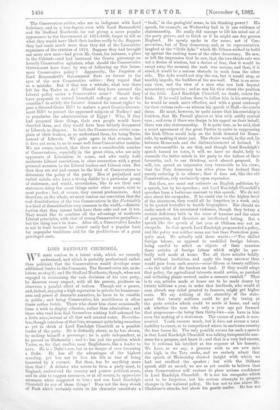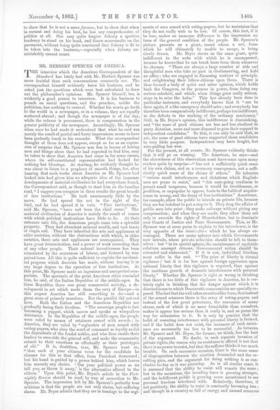LORD RANDOLPII CHURCHILL.
WE must confess to a latent wish, which we scarcely understand, and which is probably professional rather than political, that the Conservatives would develope some additional leader in the Commons. The Second-rates are, as de- baters, so stupid; and Sir Stafford Northcote, though, when not engaged in minimising the rash decisions of his own party, he deserves every respect, with all his powers, produces on observers a painful effect of tedium. Though not a proses, and, indeed, enjoying a high reputation in private for humorous- ness and power of dramatic narrative, he loves to be sensible in public ; and being Conservative, his sensibleness is often times- rather feeble. Those who cheer him cheer occasionally from a wish to display adhesion, rather than admiration ; and those who read him and themselves wishing half-ashamed for a little wine, instead of all that well aerated water. Neverthe- less, though conscious of that bias, we cannot quite bring ourselves as yet to think of Lord Randolph Churchill as a possible leader of the party. He is distinctly clever, as he has shown, by making himself a personage ; he is quite independent, as he proved on Wednesday ; and he has just the position which Tories, or, for that matter, most Englishmen, like a leader to have. He is a Duke's son, but in no danger of ever becoming a Duke. He has all the advantages of the highest standing, yet has not to live his life in fear of being bonneted by a coronet. But then, has he anything more than that ? A debater who means to form a party must, in England, understand the •country and possess political sense; and be able to suggest measures, or at all events, to appreciate measures when suggested to him ; and can Lord Randolph Churchill do any of those things ? Does not the deep streak of Puck which certainly exists in his character constitute a
"fault,' in the geologists' sense, in his thinking power ? His speech, for example, on Wednesday had in it one evidence of statesmanship. He really did manage to lift his mind out of
the party groove, and to think as if he might one day govern England. He openly spoke in the name, not of Con- servatism, but of Tory democracy, and, as its representative, laughed at the "little dyke" which Mr. Gibson wished to build up against the rushing wave of the other democracy. He saw, or left the impression that he saw, that the two-thirds rule was not a device of wisdom, but a device of fear, that it would be swept away the moment the rush was serious, and that, if it stood, it would be a serious obstacle to work from the other side. The dyke would not stop the sea, but it would stop, or terribly impede, the builders of the sea-wall. That is an accu- rate view, and the view of a man who can look beyond momentary exigencies ; and so was his view about the position of the Irish. Lord. Randolph Churchill, no doubt, courts the Irish. If he could induce them to follow him in his escapades, he would be much more effective, and with a great contempt for their serious ends—as witness his speech at Hull—he courts them. He must, however, be quite aware that his courtship is fruitless, that Mr. Parnell glances at him with coldly cynical eyes ; and even if there was design in his appeal on their behalf, there was also statesmanship. It is quite true, as he said, that a secret agreement of the great Parties to unite in suppressing the Irish Ultras would help on the Irish demand for Home- rule, by making it more just. The choice would, in the end, lie between Home-rule and the disfranchisement of Ireland. It was statesmanlike to see that, and though Lord Randolph's speech turned no votes, it will, we have no doubt, help to reconcile the better minds in his party to the failure of their favourite, and, to our thinking, most absurd proposal. It will, too, spread an impression very favourable to his views, that the Tory democracy has other plans for Ireland than merely reducing it to silence ; that it does not, like the old Conservatism, rely exclusively upon repression.
But then, one must not estimate an English politician by a speech, but by his speeches; and Lord Randolph Churchill's speeches form a ludicrous contrast to this speech. We do not care about his escapades. If he could rise to the higher level of the statesman, they would all be forgotten in a week, only to be quoted hereafter in hostile biographies. Ner should we make much of his occasional violences, though they betray a certain deficiency both in the sense of humour and the sense of proportion, and therefore an intellectual failing. But, a speech like the speech of last year at Oldham was not an escapade. In that speech Lord Randolph propounded a policy, and the policy was neither more nor less than Protection gone quite mad. He actually said these words :—" Tax skilled foreign labour, as opposed to unskilled foreign labour, being careful to select as objects of their taxation those articles of foreign labour which might be per- fectly well made at home. Tax all those articles boldly and without hesitation, and apply the large revenue they • would gain from such source—some fifteen or twenty millions —to the relief of the burdens on land. If they would adopt that policy, the agricultural interests would revive, as parched and withering plants revived under a summer rainfall." That is to say, articles made at home are to be made dearer by twenty millions a year, in order that landlords, who would at once absorb any relief granted to farmers, might get higher rents. We say nothing of the absurdity of the state- ment that twenty millions could be got by taxing at the ports articles which could be made at home, and only ask whether the man who only a year ago put forward that programme—he being then thirty-two—can have in him even the making of a statesman. The excuse of youth is non- sensical. Youth excuses much, but it does not excuse a total inability to count, or to comprehend where in one's own country the true forces lie. The only possible excuse for such a speech is that Lord Randolph Churchill was talking irresponsible non- sense for a purpose, and knew it ; and that is a very bad excuse, for it redeems his intellect at the expense of his honesty. We have, as we say, a genuine wish to see new men rise high in the Tory ranks, and we entirely admit that the speech of Wednesday showed insight with which we had not credited the speaker ; but with the Oldham speech still on record, we are as yet unable to believe that even Conservatives will venture to place serious confidence in Lord Randolph Churchill. It is not his escapades which need to be forgotten, but his serious attempts to propose changes in the national policy. He has not to rise above Mr. Gladstone's attacks, but above his gentle smiles. He has not
to show that he is not a mere farceur, but to show that when in earnest and doing his best, he has any comprehension of politics at all. One may quite forgive Johnny a sportive tendency to stand on his head, and throw somersaults on the pavement, without being quite convinced that Johnny is fit to be taken into the business,—especially when Johnny un- mistakably cannot count.



































 Previous page
Previous page